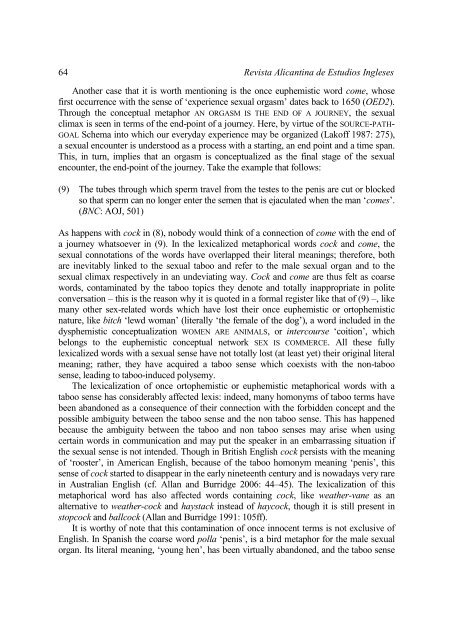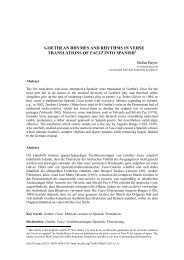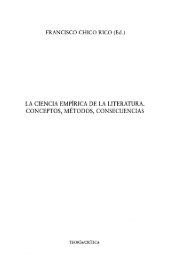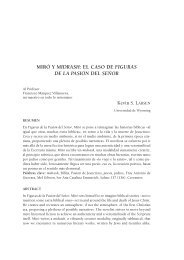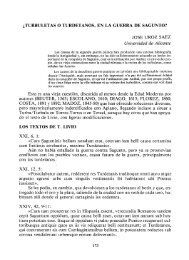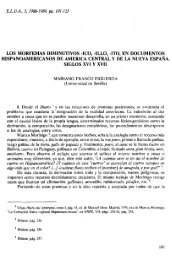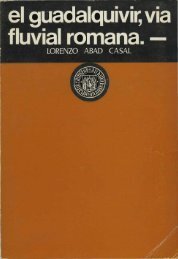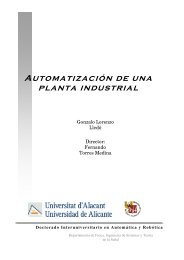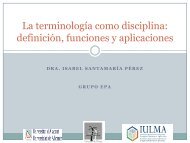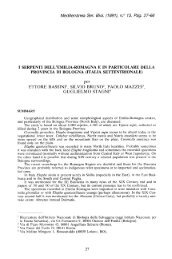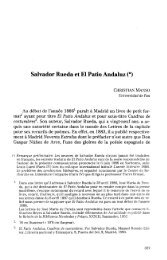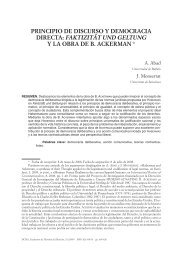Conceptual Metaphors in Taboo-Induced Lexical Variation
Conceptual Metaphors in Taboo-Induced Lexical Variation
Conceptual Metaphors in Taboo-Induced Lexical Variation
You also want an ePaper? Increase the reach of your titles
YUMPU automatically turns print PDFs into web optimized ePapers that Google loves.
64 Revista Alicant<strong>in</strong>a de Estudios Ingleses<br />
Another case that it is worth mention<strong>in</strong>g is the once euphemistic word come, whose<br />
first occurrence with the sense of ‘experience sexual orgasm’ dates back to 1650 (OED2).<br />
Through the conceptual metaphor AN ORGASM IS THE END OF A JOURNEY, the sexual<br />
climax is seen <strong>in</strong> terms of the end-po<strong>in</strong>t of a journey. Here, by virtue of the SOURCE-PATH-<br />
GOAL Schema <strong>in</strong>to which our everyday experience may be organized (Lakoff 1987: 275),<br />
a sexual encounter is understood as a process with a start<strong>in</strong>g, an end po<strong>in</strong>t and a time span.<br />
This, <strong>in</strong> turn, implies that an orgasm is conceptualized as the f<strong>in</strong>al stage of the sexual<br />
encounter, the end-po<strong>in</strong>t of the journey. Take the example that follows:<br />
(9) The tubes through which sperm travel from the testes to the penis are cut or blocked<br />
so that sperm can no longer enter the semen that is ejaculated when the man ‘comes’.<br />
(BNC: AOJ, 501)<br />
As happens with cock <strong>in</strong> (8), nobody would th<strong>in</strong>k of a connection of come with the end of<br />
a journey whatsoever <strong>in</strong> (9). In the lexicalized metaphorical words cock and come, the<br />
sexual connotations of the words have overlapped their literal mean<strong>in</strong>gs; therefore, both<br />
are <strong>in</strong>evitably l<strong>in</strong>ked to the sexual taboo and refer to the male sexual organ and to the<br />
sexual climax respectively <strong>in</strong> an undeviat<strong>in</strong>g way. Cock and come are thus felt as coarse<br />
words, contam<strong>in</strong>ated by the taboo topics they denote and totally <strong>in</strong>appropriate <strong>in</strong> polite<br />
conversation – this is the reason why it is quoted <strong>in</strong> a formal register like that of (9) –, like<br />
many other sex-related words which have lost their once euphemistic or ortophemistic<br />
nature, like bitch ‘lewd woman’ (literally ‘the female of the dog’), a word <strong>in</strong>cluded <strong>in</strong> the<br />
dysphemistic conceptualization WOMEN ARE ANIMALS, or <strong>in</strong>tercourse ‘coition’, which<br />
belongs to the euphemistic conceptual network SEX IS COMMERCE. All these fully<br />
lexicalized words with a sexual sense have not totally lost (at least yet) their orig<strong>in</strong>al literal<br />
mean<strong>in</strong>g; rather, they have acquired a taboo sense which coexists with the non-taboo<br />
sense, lead<strong>in</strong>g to taboo-<strong>in</strong>duced polysemy.<br />
The lexicalization of once ortophemistic or euphemistic metaphorical words with a<br />
taboo sense has considerably affected lexis: <strong>in</strong>deed, many homonyms of taboo terms have<br />
been abandoned as a consequence of their connection with the forbidden concept and the<br />
possible ambiguity between the taboo sense and the non taboo sense. This has happened<br />
because the ambiguity between the taboo and non taboo senses may arise when us<strong>in</strong>g<br />
certa<strong>in</strong> words <strong>in</strong> communication and may put the speaker <strong>in</strong> an embarrass<strong>in</strong>g situation if<br />
the sexual sense is not <strong>in</strong>tended. Though <strong>in</strong> British English cock persists with the mean<strong>in</strong>g<br />
of ‘rooster’, <strong>in</strong> American English, because of the taboo homonym mean<strong>in</strong>g ‘penis’, this<br />
sense of cock started to disappear <strong>in</strong> the early n<strong>in</strong>eteenth century and is nowadays very rare<br />
<strong>in</strong> Australian English (cf. Allan and Burridge 2006: 44–45). The lexicalization of this<br />
metaphorical word has also affected words conta<strong>in</strong><strong>in</strong>g cock, like weather-vane as an<br />
alternative to weather-cock and haystack <strong>in</strong>stead of haycock, though it is still present <strong>in</strong><br />
stopcock and ballcock (Allan and Burridge 1991: 105ff).<br />
It is worthy of note that this contam<strong>in</strong>ation of once <strong>in</strong>nocent terms is not exclusive of<br />
English. In Spanish the coarse word polla ‘penis’, is a bird metaphor for the male sexual<br />
organ. Its literal mean<strong>in</strong>g, ‘young hen’, has been virtually abandoned, and the taboo sense


